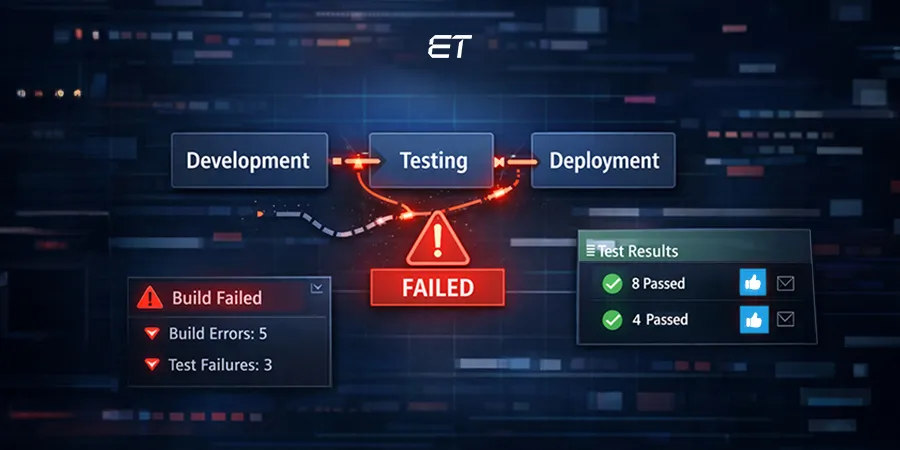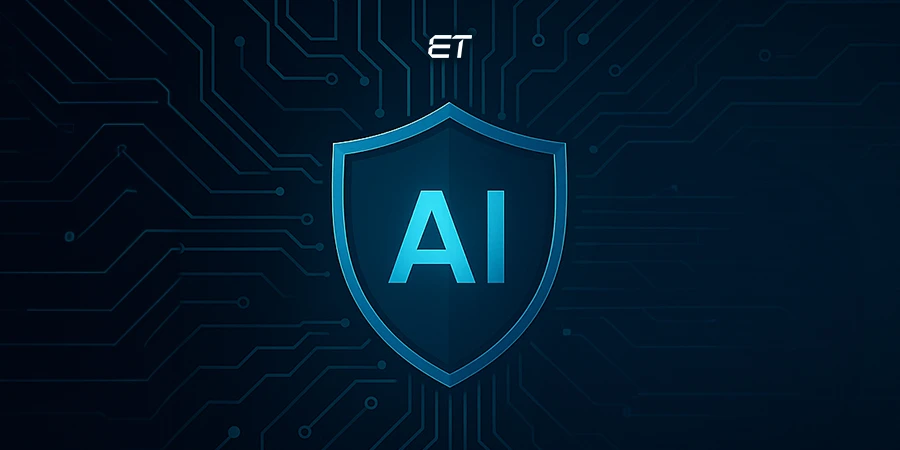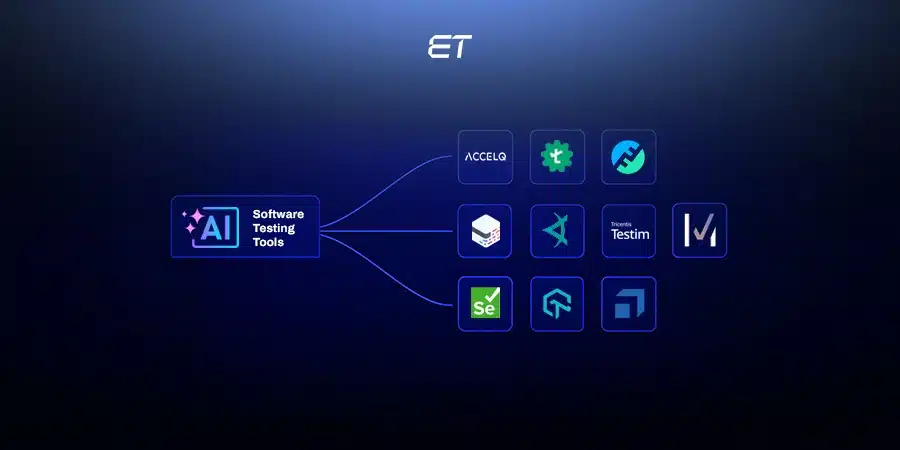
Top 10 AI Software Testing Tools for 2026
What if a single undetected bug cost your company millions, eroded customer trust or derailed a product launch? In 2026, this is reality.
Consider the recent case of Google Cloud’s June 2026 global outage—a flawed API rollout that disrupted services for 1.5B+ users, and crippled mission-critical applications. The result? Even tech giants are vulnerable when testing fails to keep pace.
This is where AI software testing tools are transforming QA through automation, and predictive insights. Traditional manual, and scripted methods can’t match the speed, and scale of today’s release cycles, and AI-driven systems. The demand, and is clear: deliver faster, smarter, and more resilient applications.
In this blog, we explore the Top 10 AI Software Testing Tools for 2026, highlighting their technical strengths, enterprise readiness, and ROI impact.
What is AI Testing?
AI testing is the practice of using artificial intelligence, primarily machine learning, natural language processing, and predictive analytics. It automates, improves, and optimizes software quality assurance.
Unlike traditional testing, which relies heavily on manual scripting and repetitive maintenance, AI testing learns from application behaviour, adapts to UI changes, predicts potential failures, and automatically generates test scenarios.
This results in faster test cycles, higher accuracy, reduced flaky tests, and more reliable releases, especially in dynamic, high-velocity development environments.
What Makes an AI Software Testing Tool Truly AI-Powered?
AI-powered testing goes beyond simple automation by predicting defects before they surface. It makes testing adaptive, intelligent, and self-optimizing. Instead of breaking with every UI tweak or update, these tools learn, adjust, and improve continuously.

The result? Less firefighting, more focus on quality.
- Self-Healing Scripts – Instead of burning hours fixing broken locators, AI automatically adapts tests to UI changes—reducing maintenance effort by up to 95%.
- Intelligent Test Generation – Tools analyze real user flows, and system behavior to auto-generate relevant cases.
- Visual Validation – AI mimics human perception to detect layout drift, color mismatches, or overlapping elements. AI software testing tools catch subtle UI issues that traditional tests miss before end users see them.
- Smart Analytics & Root Cause Analysis – AI surfaces flaky tests, prioritizes fixes, and pinpoints failures. Firms adopting AI-driven analytics report up to 70% less maintenance effort, and earlier defect detection.
Did you know that 50% of software failures are due to inadequate testing? Discover how eLuminous ensures reliability with structured QA processes.
Quick Comparison: Top AI Software Testing Tools for 2026
Here is a quick comparison of how the leading AI software testing tools stack up, helping you choose the right fit based on strengths, AI capabilities, and practical value.
AI Testing Tools at a Glance
| Tools | Leading For | Key AI Feature | Perspective |
| ACCELQ Autopilot | Codeless enterprise automation | Autonomous test design | Best for large teams needing cross-platform intelligence |
| Testsigma | NLP-based accessible testing | Plain English → executable tests | Ideal for Agile teams and non-technical testers |
| Functionize | Self-maintaining test automation | NLP test generation + self-healing | Great for reducing test maintenance at scale |
| Mabl | Cloud-native DevOps testing | Auto-healing + predictive performance | Suited for CI/CD-heavy, fast-moving teams |
| Applitools | Visual AI testing | Computer-vision visual validation | Essential for pixel-perfect UI and UX validation |
| Testim | Stable test automation | Smart locators + ML stability | Balanced choice for mid-market teams |
| Meticulous | Real-user behaviour testing | Session-capture intelligence | Strong for UX-driven teams needing real-world coverage |
| Selenium (AI Plugins) | Customisable open-source automation | Self-healing plugins | Best for technical teams wanting AI flexibility |
| LambdaTest (KaneAI) | Conversational testing | Natural language test creation | Future-ready option for AI-first QA workflows |
| Tricentis Tosca | Enterprise-grade intelligent testing | Risk-based optimisation | Preferred for regulated, high-complexity ecosystems |
This table gives a clear, decision-ready view, but the best AI software testing tools always depend on your team’s skills, application complexity, and automation maturity.
Best AI Software Testing Tools Powering Quality in 2026
In 2026, the role of AI in software testing has shifted from an experimental add-on to an enterprise necessity. Organizations are no longer asking if they should adopt AI Software Testing Tools but how fast they can scale it across complex delivery pipelines.
The following tools represent the leaders in this transition that combine speed, and enterprise-grade resilience to redefine the future of quality engineering.
Category A: AI-Native & Codeless Automation
For tech teams prioritizing speed, and accessibility.
1. ACCELQ Autopilot

ACCELQ Autopilot represents the top leader in AI-driven testing automation. This platform eliminates the traditional barriers between business analysts, testers, and developers by providing a truly codeless environment that speaks everyone’s language.
Key Features:
- Autonomous Test Design: AI algorithms automatically generate comprehensive test scenarios based on application behavior analysis
- Cross-Platform Intelligence: Single test creation automatically adapts across web, mobile, API, and desktop environments
- Predictive Maintenance: Machine learning models predict, and prevent test failures before they occur
Pros:
- Zero coding requirements enable broader team participation
- Enterprise-scale capabilities with robust governance features
- Seamless integration with existing DevOps pipelines
- Comprehensive reporting with actionable insights
Cons:
- Premium pricing may be prohibitive for smaller teams
- Learning curve for maximizing AI feature utilization
- Heavy reliance on cloud infrastructure
Our Take: Our experienced QA lead, Tatyasaheb’s Take: This isn’t just a multi-tool; it’s a cross-platform End-to-end tool. If your enterprise struggles with complex, cross-platform systems (Web, Mobile, API, Desktop) and has the budget for high-end governance, this is a worthy choice for scaling quality across the entire stack.
2. Testsigma
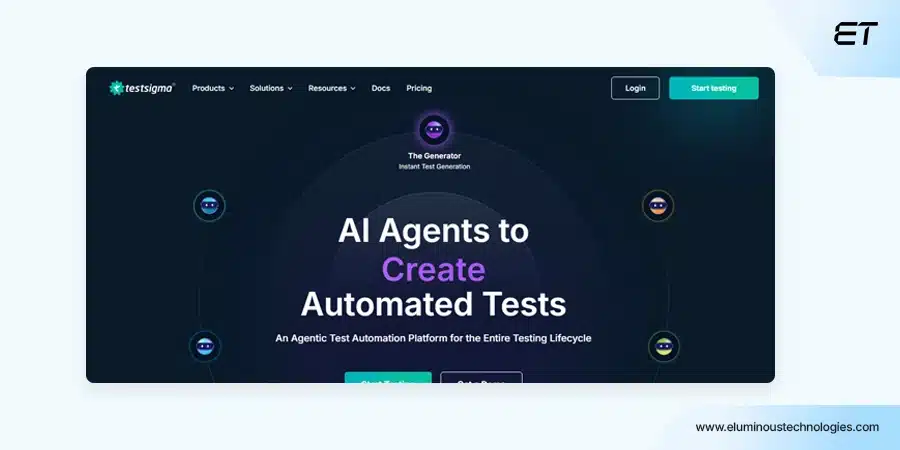
Testsigma has cracked the code on making AI testing accessible to everyone, regardless of technical background. By using Natural Language Processing, it transforms plain English into executable test automation, a top requirement for organizations looking to democratize testing.
Key AI Features:
- NLP-Powered Test Authoring: Write tests in plain English that automatically convert to executable automation
- GenAI Test Intelligence: AI suggests test scenarios based on application analysis, and industry best practices
- Smart Maintenance: Automatically updates tests when application changes are detected
Pros:
- Exceptionally user-friendly for non-technical team members
- Rapid test creation, and deployment
- Strong community support, and documentation
- Cost-effective for growing teams
Cons:
- Limited customization for complex enterprise scenarios
- Dependency on cloud infrastructure for AI features
- May require additional tools for comprehensive reporting
Our Take: Perfect for hyper-Agile teams who must maintain velocity without being bottlenecked. Its NLP feature democratizes test automation, making UAT (User Acceptance Testing) and business analysts direct contributors to automation coverage.
3. Functionize

Functionize takes a pragmatic approach to AI testing by focusing on the real challenges: slow test creation, and high maintenance overhead. Their NLP engine transforms testing from a technical bottleneck into a business-aligned activity.
Key Features:
- NLP Test Generation: Natural language processing creates tests from simple descriptions
- Self-Healing Architecture: Tests automatically adapt to UI changes without manual intervention
- Visual Recognition: AI-powered visual testing identifies elements regardless of code changes
Pros:
- Significant reduction in test maintenance time
- Strong visual testing capabilities
- Intuitive user interface
- Excellent API testing integration
Cons:
- Limited offline capabilities
- Pricing can escalate with advanced feature usage
- Learning curve for maximizing AI benefits
Our take: Our experienced development team noted that the key is consistent performance under unstable conditions. When managing critical production pipelines, Functionize excels at delivering reliable, self-maintaining tests that minimize the high-cost human intervention associated with traditional, brittle frameworks.
4. Mabl

Mabl sets the benchmark for cloud-native testing, where machine learning is not just a feature but the foundation. This platform recognizes that modern applications are dynamic, and testing tools must be equally adaptive.
Key Features:
- Auto-Healing Tests: Machine learning automatically fixes broken tests without human intervention
- Performance AI: Intelligent performance monitoring with predictive insights
- Accessibility Intelligence: AI-powered accessibility testing with comprehensive compliance checking
Pros:
- Seamless DevOps integration with minimal setup
- Comprehensive insights covering functionality, performance, and accessibility
- Strong collaborative features for distributed teams
- Continuous learning improves accuracy over time
Cons:
- Cloud-only deployment may not suit all security requirements
- Limited support for legacy applications
- Advanced features require technical expertise
Our take: If your enterprise’s release process is a high-speed, continuous pipeline, Mabl’s native intelligence and minimal setup ensure that testing is as agile and adaptive as the development process itself.
Category B: Visual, and Web-Focused AI
For teams where user experience is paramount.
5. Applitools
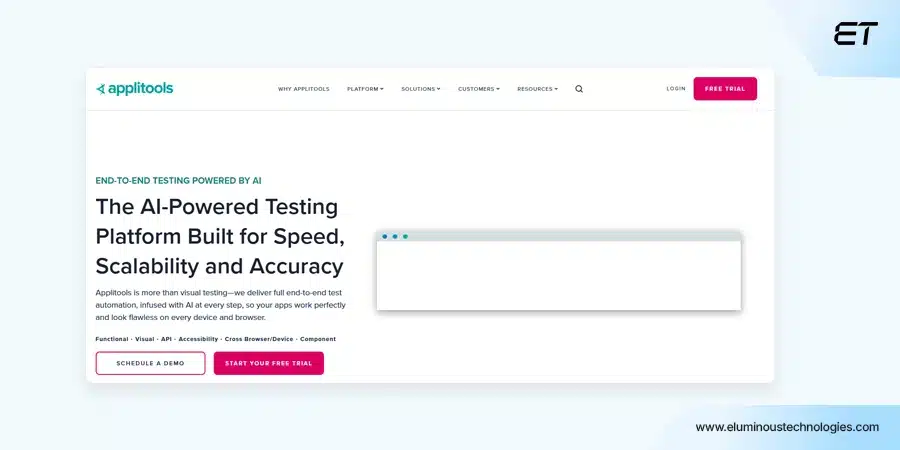
Applitools has created a new category of testing: Visual AI. Their ‘Eyes’ platform does not just check if an application functions, but ensures it appears exactly as intended across a vast range of devices, browsers, and viewports.
Key Features:
- Visual AI Engine: Advanced computer vision detects visual bugs that traditional testing misses
- Cross-Browser Intelligence: AI validates visual consistency across thousand of browser, and device combinations
- Root Cause Analysis: Machine learning pinpoints the exact cause of visual differences
Pros:
- Industry-leading visual testing accuracy
- Comprehensive cross-browser, and device coverage
- Integration with all major testing frameworks
- Detailed visual reporting with actionable insights
Cons:
- Premium pricing for advanced features
- Primarily focused on visual aspects rather than functional testing
- Requires integration with other tools for comprehensive testing
Our take: As per our experienced project manager, Nitin Mahajan, any brand where the UI/UX is the product, Applitools is essential, not optional. The ROI of catching a visual defect on a critical conversion path before it reaches production is simply immeasurable for a high-traffic e-commerce or financial platform.
6. Testim

Testim strikes an elegant balance between AI sophistication, and practical usability. Their platform uses machine learning to create tests that are both intelligent, and stable by tackling the two biggest challenges in automated testing: slow test creation, and high maintenance.
Key Features:
- Smart Locators: AI identifies elements using multiple attributes, making tests more resilient
- Machine Learning Stability: Algorithms learn from test runs to improve reliability over time
- Intelligent Test Creation: AI assists in generating comprehensive test scenarios
Pros:
- Excellent balance of power, and usability
- Strong stability features reduce maintenance overhead
- Good integration with existing development workflows
- Reasonable pricing for mid-market organizations
Cons:
- Limited customization for complex enterprise requirements
- AI features may require time to reach full effectiveness
- Documentation could be more comprehensive
Our Take: Testim is ideal for teams who want AI benefits without AI complexity. It is sophisticated enough to solve real problems while remaining approachable for everyday use.
7. Meticulous

Meticulous offers a novel approach to AI testing: rather than generating synthetic tests, it captures, and replays actual user interactions. This session-based model enables more realistic, and representative test scenarios.
Key Features:
- Session Capture Intelligence: AI automatically captures, and converts user sessions into comprehensive test suites
- Behavioral Analysis: Machine learning identifies critical user paths, and potential failure points
- Automated Test Maintenance: AI updates tests based on application changes, and user behavior patterns
Pros:
- Tests based on real user behavior provide authentic scenarios
- Minimal setup required to start capturing valuable tests
- Automatic test generation saves significant time
- Unique approach to comprehensive UI coverage
Cons:
- Limited to web applications currently
- Newer platform with evolving feature set
- May capture too many tests without proper filtering
- Privacy considerations with session recording
Innovation perspective: Meticulous applies a fundamentally different approach to test creation. For organizations prioritizing authentic user experience, it provides clearer alignment with real-world usage compared to traditional methods.
Our take: Meticulous provides an, enteprirse grade shift by generating tests based on real user behavior. For high-traffic applications, this gives you a more precise, authentic measure of quality than synthesized or traditional test scripts.
8. Selenium (with AI Plugins)

The veteran of test automation has adopted the AI revolution through a robust ecosystem of plugins, and extensions. While Selenium itself remains unchanged, the AI enhancements available today transform it into a modern, intelligent testing platform.
Key AI Features:
- Self-Healing Plugins: Third-party AI extensions automatically fix broken locators, and test steps
- Test Optimization: AI analyzes test performance, and suggests improvements
- Smart Reporting: Machine learning provides insights into test patterns, and failure trends
Pros:
- Maximum flexibility, and customization options
- Extensive community support, and resources
- Cost-effective open-source foundation
- Compatible with virtually any technology stack
Cons:
- Requires significant technical expertise
- AI features depend on third-party plugins
- Higher maintenance overhead compared to native AI platforms
- Fragmented ecosystem can complicate tool selection
Our take: Selenium with AI plugins is perfect for organizations with strong technical teams who want to maintain complete control over their testing infrastructure while gaining AI benefits incrementally.
Category C: Specialized and Enterprise AI
For organizations with complex requirements, and specific use cases.
9. LambdaTest (with KaneAI)
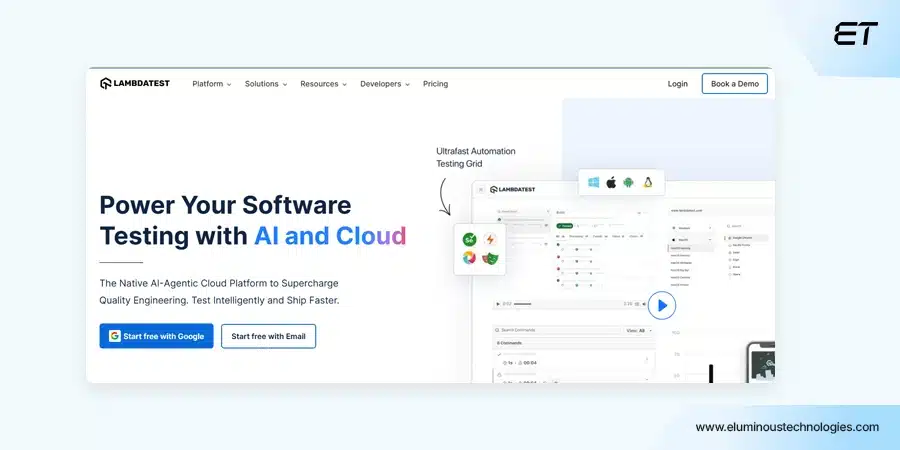
LambdaTest’s KaneAI represents the advancement of conversational testing. By positioning itself as a “QA Agent-as-a-Service,” it transforms testing from a technical task into a natural language conversation, a paradigm shift that democratizes advanced testing capabilities.
Key AI Features:
- Natural Language Test Creation: Describe tests in plain English, and AI converts those descriptions into executable tests.
- Intelligent Debugging: AI agent analyzes failures, and provides specific remediation suggestions
- GenAI Test Planning: AI generates comprehensive test strategies based on application analysis
Pros:
- Natural language interface for test creation
- Comprehensive cloud testing infrastructure
- Strong integration with popular development tools
- Scalable pricing model accommodates growing teams
Cons:
- GenAI features are still evolving, and may have limitations
- Heavy reliance on cloud connectivity
- Learning curve for maximizing AI agent capabilities
- May require supplementary tools for complex enterprise scenarios
Our take: KaneAI represents the future of Quality testing: treating testing as a conversation. This is excellent for firms needing a unified, highly scalable cloud execution grid, where the ability to rapidly generate test scenarios via plain language is a huge productivity multiplier.
10. Tricentis Tosca
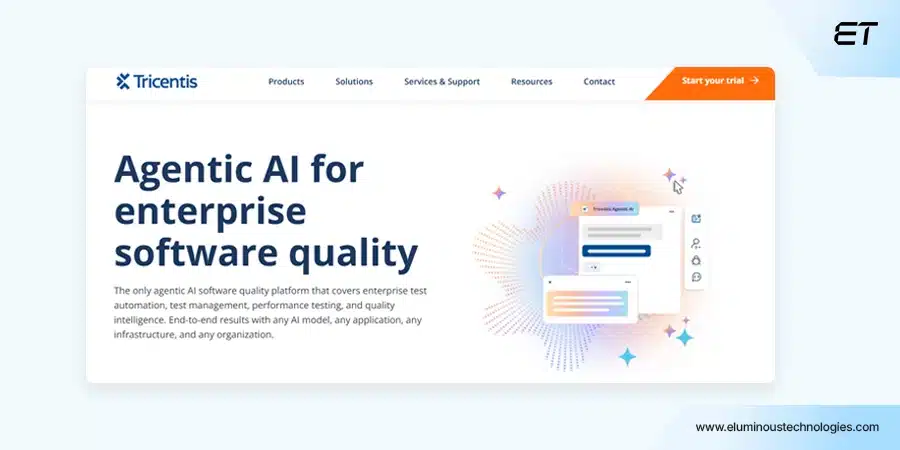
Tricentis Tosca brings enterprise-grade AI to the most demanding testing environments. With its model-based approach, and sophisticated risk analysis, it is designed for organizations where testing complexity matches business complexity.
Key Features:
- Risk-Based Test Optimization: AI analyzes code changes, and business impact to prioritize testing efforts
- Model-Based Intelligence: Machine learning optimizes test models for maximum coverage with minimal effort
- Predictive Analytics: AI forecasts potential quality issues based on historical data, and current trends
Pros:
- Exceptional handling of complex enterprise applications
- Strong SAP, and legacy system support
- Comprehensive governance, and compliance features
- Proven track record in highly regulated industries
Cons:
- Significant investment required for implementation, and training
- Complex setup, and configuration process
- May be overkill for simpler applications
- Requires dedicated expertise to maximize value
Enterprise reality: Tosca is the heavy artillery of AI testing tools. If you are dealing with core enterprise applications where failure is not an option, the investment in Tosca’s sophisticated AI capabilities pays for itself many times over.
Choosing the wrong AI tech stack can slow down innovation, and raise costs. Discover how to pick the right layers, and tools to build future-ready AI solutions.
How to Choose the Right AI Testing Tool for Your Team

Selecting the right AI software testing tool is not about chasing the latest trend but aligning capabilities with your team’s needs, skills, and workflows. Use this simple checklist to make an informed decision.
| Step | What to Check | Example Scenario |
| Define Needs | Identify key pain points | If UI changes break tests, look for self-healing; if gaps exist, seek AI-generated test cases |
| Assess Skills | Match to coding expertise | A non-technical QA team benefits from codeless, while dev-heavy teams can manage low-code/code-first |
| Set Budget | Balance cost vs value | Startups may begin with free frameworks; enterprises need licensed, compliance-ready tools |
| Test Drive | Pilot with real workflows | Run a 14-day Autify trial on your web app to see if its regression coverage matches your release cycle |
| Check Integrations | Fit with CI/CD & bug tracking | Must connect to your existing pipeline (e.g., Jenkins), and issue tracker (e.g., Jira) |
Summing Up
The transformation we are witnessing is not just about better tools but about fundamentally reimagining the role of quality assurance in software development. AI software testing tools are enabling QA teams to shift from reactive problem-solvers to proactive quality architects who shape the development process from the ground up.
The question is which AI software testing tools will best serve your organization’s unique journey toward intelligent quality assurance. Choose wisely, implement thoughtfully, and prepare for a future where testing is more reliable and genuinely thoughtful.
At eLuminous Technologies, our QA Engineers are well-versed in these AI software testing tools. We combine technical expertise with strategic foresight to deliver software that is secure, scalable, and future-ready.
Experience a QA process that uses proven AI testing tools to ensure your software is ready for enterprise-grade use.
Frequently Asked Questions
Q1. What are AI software testing tools?
AI software testing tools use machine learning and natural language processing to create, execute, and maintain test cases automatically. They reduce manual effort, detect patterns, and adapt tests when applications change.
Q2. Why should I use AI for software testing in 2026?
In 2026, AI tools for software testing are essential for speed and resilience. They help teams reduce flaky tests, improve coverage, and integrate seamlessly with CI/CD pipelines—critical for modern DevOps environments.
Q3. Which AI software testing tools are best for small teams?
Small teams benefit from codeless or low-code AI tools for software testing that are easy to adopt and maintain, without requiring deep coding expertise. The focus should be on ease of use, affordability, and quick setup.
Q4. How do self-healing tests work?
Self-healing tests use AI algorithms to detect changes in the application’s UI or environment, and automatically update locators or scripts. This reduces test failures from minor UI changes and cuts maintenance overhead.

